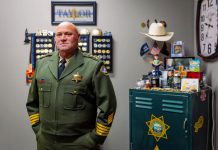The groundswell over ‘Casey at the Bat’
Actor DeWolf Hopper had invited a few New York baseball players
to the Wallick Theater on a summer evening in 1888, and planned
some new material to end the program. It was a clipping from the
San Francisco Examiner of a few months earlier. A friend had liked
the verse,
”
A Ballad of the Republic
”
and Hopper felt that an audience that relished baseball also
would like it.
Actor DeWolf Hopper had invited a few New York baseball players to the Wallick Theater on a summer evening in 1888, and planned some new material to end the program. It was a clipping from the San Francisco Examiner of a few months earlier. A friend had liked the verse, “A Ballad of the Republic” and Hopper felt that an audience that relished baseball also would like it.
Hopper was a tall, well-built man with a hearty bass voice and a splendid sense of timing. He had quite a following and when he took center stage, the audience gave him its full attention.
The verse was about a baseball team that had fallen behind with little chance of redeeming the game. But then, its best hitter came to the fore. Hopper rolled out the verse line by line with appropriate nuances and gestures. The listeners were rapt as the recitation progressed, having grown up on Victorian tales of the hero coming back from almost impossible odds to triumph.
So when Hopper delivered the last words, “For mighty Casey has struck out,” there was a moment or so of startled silence. Then someone laughed and the crowd exploded into laughter and applauded and called Hopper back for bow after bow.
Ever since, “Casey at the Bat” (it is rarely called by its official name) has been dear to Americans. It has been the subject of movies, including a Disney animated treatment, skits and parodies for more than a century.
Hopper had little inkling of what it would mean to him. Time after time on stage and even at private parties he was called upon to deliver the verse. He appeared in good roles in plays and Gilbert and Sullivan operettas, but was known primarily as the father of “Casey.”
Because the verse in the Examiner was signed simply “Phin,” few people knew who had written it. Several men stepped forward to claim authorship – and a share of Hopper’s proceeds. Each was proven a charlatan, and it was not until several years after he had first delivered it that Hopper met the author, Ernest Lawrence Thayer.
Thayer had been a classmate of William Randolph Hearst at Harvard, and when Hearst took over management of The Examiner, he asked Thayer to be its humor editor.
Hopper eventually resigned himself to being inextricably linked with the verse. He delivered it more than 10,000 times. Toward the end of his life in 1935, he granted a newspaper reporter an interview. When he asked Hopper about “Casey,” the actor snapped, “I ask nothing but that it never be mentioned to me again. I cannot tell you how much I have come to despise it.”
Hopper may have been the only American who felt that way. Millions of his countrymen, during his lifetime and after, have smiled in anticipation of Casey confidently stepping up to the plate with thousands of tongues applauding him – and his unexpected fate.









